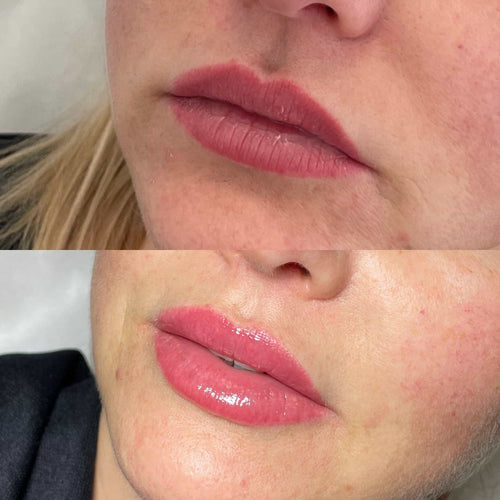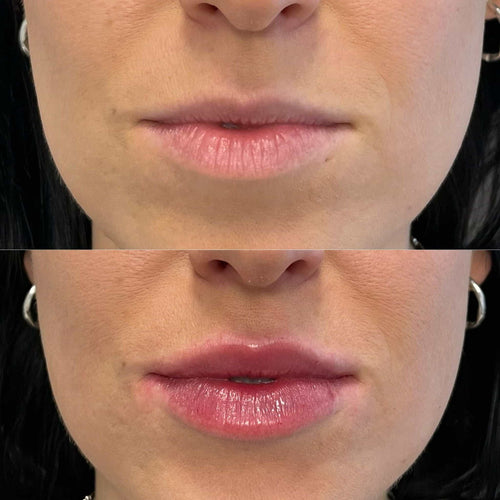Book a Consultation for Dermal Fillers with Dr. Laura Geige at It’s Me and You Clinic
Legal Age Requirements
Age Restrictions by State

The legal age requirement for lip fillers varies by state and individual clinic policy.
Generally, most states require individuals to be at least 18 years old to receive cosmetic injectables like lip filler.
However, some states allow minors to consent to medical procedures with parental or guardian consent, which may extend to non-surgical treatments such as lip filler.

It’s important to note that even in states where minors can consent with parental permission, individual clinics may have stricter age restrictions.
For example, a clinic might choose to only treat individuals who are 21 or older for lip fillers.
Therefore, it’s crucial to contact the specific clinic you’re interested in to confirm their age policy.
Additionally, remember that even if you meet the legal age requirement, a qualified medical professional will assess your individual suitability for lip filler based on factors such as skin type, health history, and desired outcomes.
They may advise against treatment if they deem it unsafe or inappropriate for you.
Parental Consent Laws
Legal age requirements for cosmetic procedures like lip fillers vary significantly from country to country and even within different states or provinces.
Generally, most countries require individuals to be at least 18 years old to consent to medical procedures, including cosmetic ones. This is based on the principle that adults are legally capable of making informed decisions about their health and well-being.
However, some jurisdictions may allow minors to receive certain cosmetic treatments with parental or guardian consent. The age at which parental consent becomes necessary also varies. Some places may require consent for any medical procedure performed on a minor, while others might have different ages of majority for specific types of procedures.
For example, in the United States, federal law does not specifically regulate the age at which someone can receive lip fillers. However, most states have laws requiring parental consent for minors under 18 to receive medical treatment, including cosmetic procedures.
It’s important to note that even if a minor is allowed to receive lip fillers with parental consent, there are often additional considerations.
Providers may require psychological evaluations or counseling to assess the minor’s understanding of the risks and benefits of the procedure.
Some states might also have specific laws regarding the types of cosmetic procedures that minors can undergo with parental consent. It is crucial for anyone considering lip fillers, especially those under 18, to consult with a qualified medical professional and thoroughly research their local laws and regulations.
Factors Influencing Individual Treatment Decisions
Maturity and Decision-Making Capacity
A multitude of factors influence individual treatment decisions regarding cosmetic procedures like lip fillers, including maturity and decision-making capacity.
Maturity, often assessed subjectively, encompasses emotional development, impulse control, and the ability to weigh long-term consequences against immediate gratification. Individuals considered more mature typically demonstrate a better understanding of risks and benefits associated with procedures, have realistic expectations, and are less likely to make rash decisions driven by social pressures.
Decision-making capacity refers to the legal and ethical ability to understand information about a medical treatment, appreciate its potential consequences, and make a voluntary choice. Legal requirements for consent vary by jurisdiction and often consider factors like age, cognitive abilities, and mental state.
For cosmetic procedures, determining decision-making capacity can be complex as it involves subjective assessments of aesthetic motivations and the influence of peer pressure or societal ideals.
Age is a significant factor but not the sole determinant. Some minors may possess the maturity and cognitive abilities to make informed decisions about cosmetic procedures, while some adults may struggle with such judgments.
Ultimately, medical professionals bear the responsibility of carefully assessing each patient’s maturity and decision-making capacity before proceeding with any treatment. This involves open communication, thorough explanations of risks and benefits, and addressing any potential underlying emotional or psychological factors influencing the desire for the procedure.
Medical Considerations
Several factors influence an individual’s decision to undergo cosmetic procedures like lip fillers, including their personal motivations, aesthetic goals, and perceived social pressures.
Medical considerations play a crucial role in determining eligibility for treatment. Age is one such consideration. While there isn’t a specific age cutoff for lip fillers, most practitioners have a minimum age requirement, typically around 18 years old, to ensure the patient has reached physical maturity and can fully understand the risks and benefits involved.
Beyond age, medical history is paramount. Patients with certain conditions like bleeding disorders, autoimmune diseases, or allergies may not be suitable candidates for lip fillers. Pre-existing skin infections or active acne around the treatment area could also pose complications.
Pregnancy and breastfeeding are additional factors that may necessitate postponement of the procedure as hormonal fluctuations and potential drug interactions need careful consideration. A thorough medical evaluation by a qualified practitioner is essential to assess individual suitability for lip fillers.
Furthermore, realistic expectations and understanding the limitations of the procedure are vital. Lip fillers can enhance lip volume and shape but cannot drastically alter facial structure or address underlying insecurities. Open communication between the patient and the practitioner about desired outcomes and potential risks is crucial for ensuring a safe and satisfactory experience.
Ethical Implications of Treating Minors
Long-Term Effects and Potential Risks
Treating minors with lip filler presents a multitude of ethical implications, potential long-term effects, and risks that warrant serious consideration.
**Ethical Considerations:**
-
Informed Consent: Minors lack the full capacity to understand the complexities and potential risks associated with cosmetic procedures like lip filler. Obtaining genuine informed consent from a minor is ethically challenging, as their decision-making may be influenced by peer pressure, societal beauty standards, or parental expectations.
-
Bodily Autonomy: Every individual has the right to make decisions about their own body. However, minors are still developing their sense of self and autonomy. Injecting filler into their lips could be seen as an infringement on their bodily integrity and potentially undermine their future decision-making regarding cosmetic procedures.
-
Psychological Impact: Society often places undue pressure on young people to conform to certain beauty standards. Allowing minors to undergo lip fillers could exacerbate these pressures and contribute to body image issues, low self-esteem, and mental health concerns.
Book a Consultation for Dermal Fillers with Dr. Laura Geige Today
**Potential Long-Term Effects:**
Schedule a Dermal Filler Consultation with Dr. Laura Geige Now
-
Facial Asymmetry: Improper injection techniques can lead to uneven results, causing facial asymmetry that may become more pronounced as the minor ages.
-
Tissue Damage: Lip fillers can cause tissue damage, inflammation, and scarring if not administered correctly. These complications can have long-lasting effects on the appearance and function of the lips.
-
Hypertrophic Scarring: Some individuals are prone to developing hypertrophic scars, which are raised and thickened scars that can be disfiguring.
**Risks:**
-
Allergic Reactions: Allergic reactions to filler substances can range from mild redness and swelling to severe anaphylaxis, a life-threatening condition.
-
Infection: Any injection carries the risk of infection. If proper sterilization techniques are not followed, the risk of infection increases significantly.
-
Vascular Occlusion: Injecting filler into blood vessels can block blood flow, leading to tissue death (necrosis). This is a rare but serious complication.
The decision to allow minors access to lip fillers raises complex ethical dilemmas that require careful consideration. The potential for long-term effects and risks should not be overlooked.
Body Image Concerns and Societal Pressures
The increasing accessibility of cosmetic procedures like lip fillers raises significant ethical concerns, particularly when minors are involved. The intersection of societal pressures, body image concerns, and the marketing strategies targeting young people creates a complex landscape demanding careful consideration.
Here are some key ethical implications:
-
Minors’ Capacity for Informed Consent: Children and teenagers may not have the cognitive maturity or life experience to fully understand the risks and long-term consequences of cosmetic procedures. Their understanding of concepts like permanence, potential complications, and societal expectations might be underdeveloped.
-
Pressure from Peers and Social Media: The pervasive influence of social media amplifies body image pressures, particularly on young people who are still forming their identities. Images of “ideal” beauty, often digitally enhanced, can create unrealistic expectations and lead to feelings of inadequacy.
-
Vulnerability to Marketing Tactics: The cosmetic industry frequently targets young people through marketing campaigns that exploit insecurities and promote quick fixes for perceived flaws. These tactics can pressure minors into seeking procedures they may not truly need or want.
-
Long-Term Impact on Body Image and Self-Esteem: Cosmetic procedures, even seemingly minor ones, can have lasting effects on body image and self-esteem. Dissatisfaction with results or complications can lead to further insecurity and psychological distress.
Addressing these ethical concerns requires a multi-faceted approach:
-
Strict Legal Regulations: Age restrictions on cosmetic procedures should be enforced, with parental consent requirements for minors. The focus should be on protecting young people from potentially harmful decisions made under peer pressure or unrealistic expectations.
-
Enhanced Public Education: Campaigns that promote body positivity and critical thinking about media portrayals are essential. Educating young people about the potential risks and long-term consequences of cosmetic procedures can empower them to make informed choices.
-
Ethical Guidelines for Healthcare Providers: Medical professionals should adhere to strict ethical guidelines when treating minors, prioritizing their well-being over financial gain. This includes thorough patient assessment, open communication with parents or guardians, and careful consideration of the potential psychological impact of procedures.
Ultimately, fostering a society that values individual uniqueness and encourages healthy body image is crucial in mitigating the ethical dilemmas surrounding cosmetic procedures among minors.
Christina Stambolian The New Cinema Magazine Your Relationship Edge One One Three Online
- Neck Line Filler Treatment Near Byfleet, Surrey - December 24, 2024
- How Old Do You Need To Be To Get Lip Filler - December 16, 2024
- Pile Driver Sex Position - December 15, 2024
